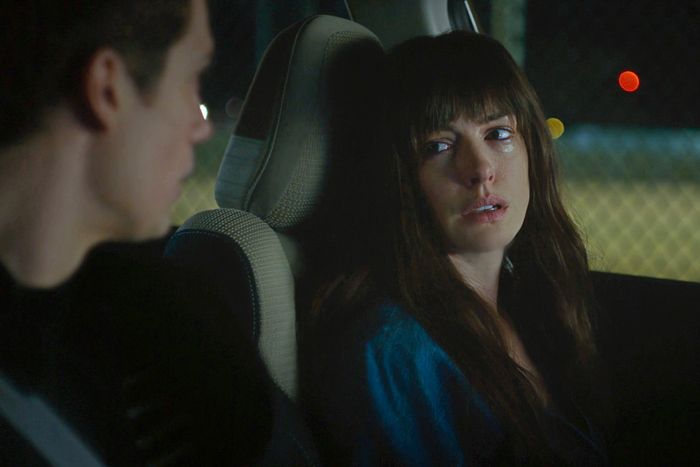
Anne Hathaway and Nicholas Galitzine live life on the edge (of tears).
Photo: Prime Video
Anne Hathaway and Nicholas Galitzine make a perfect pair in The Idea of You: They are attractive, likable actors; the former is a beloved titan of the industry and the latter is an undeniable up-and-comer; they share a musical-theater-quality earnestness that allows their screen presence to feel true and big all at once; and, most importantly, these are two of the most watery-eyed performers working today and they spend at least half this movie on the verge of crying.
What’s there to be so sad about in The Idea of You, exactly? On its face, the film projects a shiny, absurd fantasy, in which a Harry Styles–esque fictional boy bander named Hayes Campbell (Galitzine) woos the 40-year-old divorced gallery owner Solène (Hathaway) after a chance encounter at Coachella. It could happen to anyone, no doubt, it just doesn’t. But it could! And wouldn’t that be grand? you might think to yourself. But The Idea of You seems to disagree. It wouldn’t be grand to have a second chance at love in your 40s, and it wouldn’t be fun to be in an age-gap relationship with a famous person. In fact, it might make you almost cry every time you hang out with each other.
For the first 15 minutes of the film — in which Solène and Hayes share a meet-cute in his trailer that she mistakes for a VIP bathroom — these characters are safe from crying, but they’re also showing each actor at their most restrained. The inherently glamorous Hathaway awkwardly embraces “trying to be normal,” while Galitzine tries to remember in real time if he is British or American in the movie (British) and if he is British or American in real life (British). Once Hayes’s band August Moon (🙂) starts their performance, however, we’re off to the teary-eyed races.
First Solène gets weepy when Hayes gets the band to play a slow song called “Closer” about dating an older woman. Then: She tears up explaining a piece of artwork to him the next day that makes her feel “everything.” And then Hayes gets watery-eyed explaining that he either could have been a pop star or Tiny Tim in a local theater production, and unfortunately now he’s so famous that it will be stressful to have a 40-year-old girlfriend named Solène. As Hathaway pours every bit of pathos into a lunchtime description of her marriage falling apart, cuts back to Galitzine show him mirroring her tears, his mouth wavering slightly. This movie’s version of an action scene is these two actors holding water in their eyeballs until the last possible second.
It’s this kind of weepy vérité that kills the fantasy aspect of The Idea of You, a movie that, for me, called to mind the scene in the season-one finale of Girls when Jessa yells “Your dreams are not what you thought they’d be!” into a crowd of people at her wedding. It should be fun and sexy to imagine a pop star and a divorced gallery owner getting together — he’s so famous! she’s so regular! — but the film suggests that this is actually a miserable coupling, full of annoyances like “other members of the boy band” and “Instagram comments.” By the time two break up for the third (!) time in the film, as a teary Solène tells Hayes that he’s got a beautiful life ahead of him, it’s hard not to feel like these characters must be living with perpetual headaches, if not profound dehydration. The film cuts back and forth between them, standing in Solène’s doorway, all four eyes between them looking like the shallow end of a swimming pool.
While we’ve long known Hathaway to be a consummate crier, from her Oscar-winning turn as Fantine in Les Misérables to Rachel Getting Married, this sensitive side of Galitzine is a newer revelation. He can do funny (see Bottoms), and he can do stiff upper lip (Red, White & Royal Blue), but in The Idea of You Galitzine goes toe-to-toe with a world-champion near-weeper. It’s not just that he’s a sensitive singer in a boy band; it’s that he’s in touch with his feelings enough to understand how complicated life can be if you are a 40-year-old divorcée with a French name who is always being upstaged by your ex-husband. Their shared mutual empathy for each other might suck the laughs out of the film, but it’s a type of fantasy unto itself, where almost crying is its own kind of emotional edging, teetering on the edge of shared relief.

